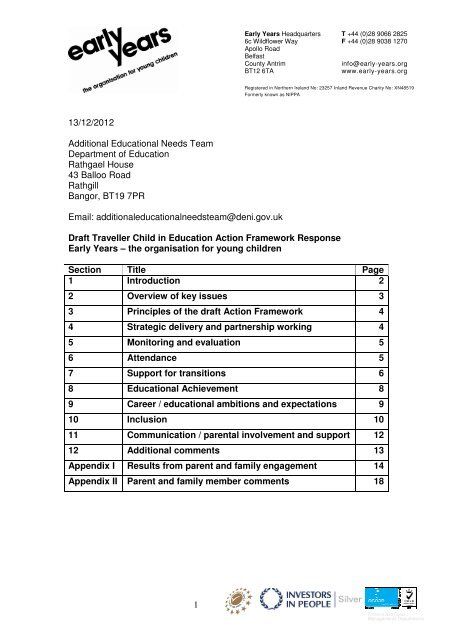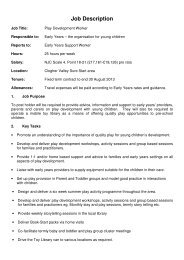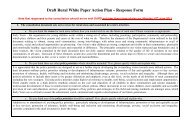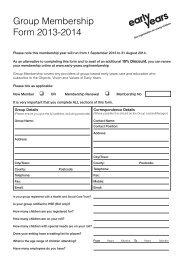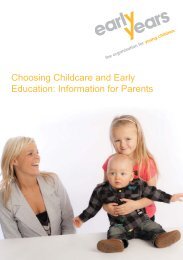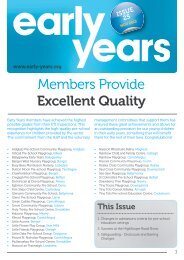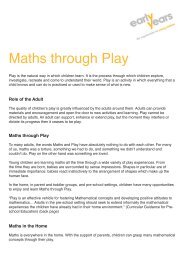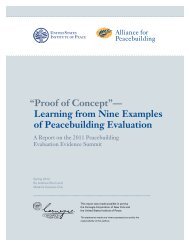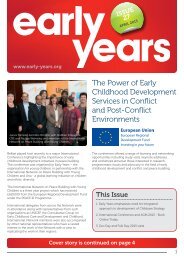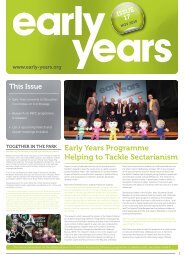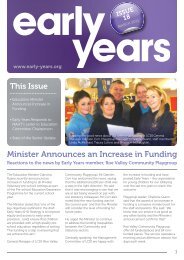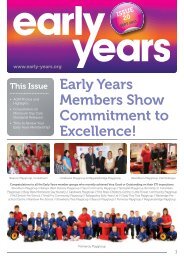Traveller Child in Education Action Framework - Early Years
Traveller Child in Education Action Framework - Early Years
Traveller Child in Education Action Framework - Early Years
Create successful ePaper yourself
Turn your PDF publications into a flip-book with our unique Google optimized e-Paper software.
<strong>Early</strong> <strong>Years</strong> Headquarters T +44 (0)28 9066 28256c Wildflower Way F +44 (0)28 9038 1270Apollo RoadBelfastCounty Antrim<strong>in</strong>fo@early-years.orgBT12 6TAwww.early-years.orgRegistered <strong>in</strong> Northern Ireland No: 23257 Inland Revenue Charity No: XN48519Formerly known as NIPPA13/12/2012Additional <strong>Education</strong>al Needs TeamDepartment of <strong>Education</strong>Rathgael House43 Balloo RoadRathgillBangor, BT19 7PREmail: additionaleducationalneedsteam@deni.gov.ukDraft <strong>Traveller</strong> <strong>Child</strong> <strong>in</strong> <strong>Education</strong> <strong>Action</strong> <strong>Framework</strong> Response<strong>Early</strong> <strong>Years</strong> – the organisation for young childrenSection Title Page1 Introduction 22 Overview of key issues 33 Pr<strong>in</strong>ciples of the draft <strong>Action</strong> <strong>Framework</strong> 44 Strategic delivery and partnership work<strong>in</strong>g 45 Monitor<strong>in</strong>g and evaluation 56 Attendance 57 Support for transitions 68 <strong>Education</strong>al Achievement 89 Career / educational ambitions and expectations 910 Inclusion 1011 Communication / parental <strong>in</strong>volvement and support 1212 Additional comments 13Appendix I Results from parent and family engagement 14Appendix II Parent and family member comments 181F<strong>in</strong>ance and FundManagements Departments
1. Introduction<strong>Early</strong> <strong>Years</strong> 1 is the largest organisation <strong>in</strong> Northern Ireland work<strong>in</strong>g with andfor all young children. It is a non-profit mak<strong>in</strong>g organisation and has beenoperat<strong>in</strong>g s<strong>in</strong>ce 1965 to promote and develop high quality, evidence-<strong>in</strong>formededucation and care services for children aged 0 – 12, their families, those whocare for and educate them and communities.Our vision is that children are strong, competent and visible <strong>in</strong> theircommunities; physically and emotionally healthy; eager and able to learn andrespectful of difference.We work with<strong>in</strong> a strong set of values which place listen<strong>in</strong>g to children andthose who care for them; a strong voice for children; parents as firsteducators; participation of children and families; community <strong>in</strong>volvement anddevelopment; partnership; <strong>in</strong>clusion and diversity and excellence andevidence-based <strong>in</strong>novation at the forefront of what we do. We believe thesevalues not only create a framework for us to provide services consistent withour positive vision of and for children but also relate very clearly to thefundamental values which must underp<strong>in</strong> this framework and the subsequentregional action plan.<strong>Early</strong> <strong>Years</strong> delivers the Toybox 2 Project which aims to significantly reducesocial and education <strong>in</strong>equalities experienced by young <strong>Traveller</strong> childrenaged 0-4 through an outreach play-based early <strong>in</strong>tervention service provided<strong>in</strong> partnership with the children, their families and key agencies and ensurethe children and families have access to high quality, <strong>in</strong>clusive early educationand family support. Another vital component of this essential rights-basedservice development model is the maximisation of the voices of <strong>Traveller</strong>children and their families. The project is delivered by n<strong>in</strong>e staff to eight areasacross Northern Ireland. This <strong>in</strong>cludes a peer support worker whosebackground and experience is very beneficial to the project. Dur<strong>in</strong>g 2011-12the team engaged directly with 197 families and 266 children, and delivered3968 play sessions. With<strong>in</strong> this context we have carried out a number of<strong>in</strong>itiatives designed to raise awareness, facilitate debate and encourage andsupport engagement on these important proposals with and for a range ofrelevant stakeholders.Initiatives have <strong>in</strong>cluded Toybox team members avail<strong>in</strong>g of opportunities from home visits orexist<strong>in</strong>g group meet<strong>in</strong>gs to highlight and discuss the ma<strong>in</strong> <strong>Framework</strong>proposals, encourage participation and seek views from 103 parents orfamily members on whether the proposals would make a difference toeducation and learn<strong>in</strong>g outcomes. <strong>Early</strong> <strong>Years</strong> Toybox team members provid<strong>in</strong>g their own practical views. Visits to two school sites (St Mary's Primary School and Mount StCather<strong>in</strong>e's Primary School) to discuss the consultation and ga<strong>in</strong> afurther level of feedback and experience.1 For more see http://www.early-years.org/2 http://www.early-years.org/toybox/2
Dissem<strong>in</strong>ation of relevant <strong>in</strong>formation <strong>in</strong> relation to the currentproposals under consideration, <strong>in</strong>corporat<strong>in</strong>g Departmental and <strong>Early</strong><strong>Years</strong> po<strong>in</strong>ts of contact for further <strong>in</strong>formation, via our external website,<strong>in</strong>ternal staff <strong>in</strong>tranet and staff and member e-brief<strong>in</strong>gs encourag<strong>in</strong>gparticipation <strong>in</strong> the consultation process.2. Overview of key issuesMore detailed responses, <strong>in</strong>corporat<strong>in</strong>g the significant feedback from parentsand families concerned, is provided <strong>in</strong> the subsequent sections andassociated appendices of this response. However the follow<strong>in</strong>g key recurr<strong>in</strong>gthemes are deemed to be of paramount importance <strong>in</strong> relation to the ultimatesuccess of these proposals. The pr<strong>in</strong>ciples established by the Taskforce on <strong>Traveller</strong> education mustclearly underp<strong>in</strong> the Department's <strong>Framework</strong> and the subsequentregional action plan from April 2013 onwards. Despite acknowledgement of the <strong>Framework</strong> be<strong>in</strong>g high level, thedocument lacks a necessary degree of detail, particularly on key termssuch as "review", which did cause confusion to consultees. It would behoped that such areas would be enhanced and clarified upon before thef<strong>in</strong>al document is released and def<strong>in</strong>itely by the <strong>Action</strong> Delivery Plan stageto be developed by the TESS from April 2013. It will be essential that the voices of relevant children and families are fullymaximised, engaged and <strong>in</strong>corporated and their participation is realisednot only <strong>in</strong> this development process but also throughout the subsequentplann<strong>in</strong>g and implementation of these proposals relat<strong>in</strong>g to educationalachievement, career and life ambitions, support for transitions, tra<strong>in</strong><strong>in</strong>g,appropriate communication, parental <strong>in</strong>volvement and effective <strong>in</strong>clusion. The <strong>Framework</strong> and subsequent regional action plan must also expresslyacknowledge the vital role of collaboration with community teams andgroups <strong>in</strong> addition to <strong>Traveller</strong> Support Groups and Schoolestablishments. Processes around <strong>in</strong>formation or tra<strong>in</strong><strong>in</strong>g on <strong>Traveller</strong> culture,employment, family patterns and lifestyles must be more than theprovision of fact-sheets and onl<strong>in</strong>e materials, be fully participatory and<strong>in</strong>volve <strong>Traveller</strong>s themselves. The importance of the provision of consistency <strong>in</strong> the journey through careand educational establishments of relevant children and of build<strong>in</strong>grelationships with the children, their parents and families is of the upmostimportance and cannot be emphasised enough. It will be vital that the development process around these proposals lookto and learn from the many good, evidence based and robustly evaluated<strong>in</strong>itiatives, such as the Media Initiative for <strong>Child</strong>ren (MIFC) Respect<strong>in</strong>gDifference programme and the Toybox Project, which are alreadyoperat<strong>in</strong>g and deliver<strong>in</strong>g well <strong>in</strong> areas rather than look<strong>in</strong>g to establish new<strong>in</strong>itiatives, programmes or activities.3
3. Pr<strong>in</strong>ciples of the draft <strong>Action</strong> <strong>Framework</strong>"I would like my child to follow their dreams and achieve more than I did andnot be discrim<strong>in</strong>ated aga<strong>in</strong>st." – Parent comment dur<strong>in</strong>g engagement processThe approach taken <strong>in</strong> the draft <strong>Action</strong> <strong>Framework</strong> document to take accountof and address the recommendations made <strong>in</strong> the report by the Taskforce on<strong>Traveller</strong> <strong>Education</strong> is to be welcomed. <strong>Early</strong> <strong>Years</strong> Toybox team memberswere key contributors to the overall work of the Taskforce and <strong>in</strong> particular tothe sub-groups concern<strong>in</strong>g <strong>Early</strong> <strong>Years</strong> and Transitions, Primary <strong>Education</strong>,Special <strong>Education</strong>al Needs and Interculturalism and Racism.The fundamental pr<strong>in</strong>ciples agreed by the Taskforce that every child is anequal child; that the expectations for <strong>Traveller</strong> children should be the same asfor all others, <strong>in</strong>clud<strong>in</strong>g access to the full range of educational experiencesfree from racial discrim<strong>in</strong>ation and prejudice; outcomes for <strong>Traveller</strong> childrenparallel<strong>in</strong>g the range of outcomes for all children; <strong>Traveller</strong> parents hav<strong>in</strong>g thesame entitlements and responsibilities as all other parents; all schools be<strong>in</strong>gopen to and welcom<strong>in</strong>g of <strong>Traveller</strong> children; and Parents of <strong>Traveller</strong> childrenhav<strong>in</strong>g access to any school of their choice, on the same basis as any otherparents, for the education of their children rema<strong>in</strong> absolutely relevant to thecontext of this consultation and have received universal agreement dur<strong>in</strong>g thisprocess. The Department is strongly recommended to expressly <strong>in</strong>corporateand underp<strong>in</strong> these pr<strong>in</strong>ciples <strong>in</strong> the advancement of this <strong>Framework</strong> and thesubsequent development and implementation of an associated regional<strong>Action</strong> Plan.4. Strategic delivery and partnership work<strong>in</strong>gThe issue of consistency is a key theme throughout this response and thedevelopment of a consistent, co-ord<strong>in</strong>ated approach across all areas topromote improved outcomes for <strong>Traveller</strong> children and families is vitallyimportant. The consultation document acknowledges that current supportprovision varies between areas. Therefore the proposal of establish<strong>in</strong>g onesupport service to help schools, children and young people and familiesregard<strong>in</strong>g education and learn<strong>in</strong>g outcomes and to maximise stakeholder<strong>in</strong>volvement received good levels of general agreement from parent or familymember engagement (94%) 3 . However, some concern was highlighteddur<strong>in</strong>g consultation with both parents or family members and otherstakeholders that a regional approach might dim<strong>in</strong>ish the effect of good work,contact or relationships that were happen<strong>in</strong>g <strong>in</strong> their areas locally. A strongmessage from our overall consultation efforts was that any regional approachadopted by the Department / TESS must avoid this from happen<strong>in</strong>g. Inclusion<strong>in</strong> the draft <strong>Action</strong> <strong>Framework</strong> that the TESS delivery plan will address theoperational recommendations of the thematic sub-groups of the Taskforceand will look to good practice locally and <strong>in</strong> other jurisdictions is to besupported. It will be essential that exist<strong>in</strong>g good practice is identified, builtupon and effectively dissem<strong>in</strong>ated. Towards this, <strong>in</strong> addition to the primaryneed to work <strong>in</strong> partnership with the children and families themselves, moreexpress reference should be made to the vital role of collaboration with3 See Appendix I.4
voluntary and community sector organisations and community teams andgroups offer<strong>in</strong>g key outreach services as well as <strong>Traveller</strong> Support Groups,NGOs and School establishments.Regard<strong>in</strong>g strategic delivery, the draft <strong>Action</strong> <strong>Framework</strong> outl<strong>in</strong>es proposalsconcern<strong>in</strong>g TESS undertak<strong>in</strong>g jo<strong>in</strong>t plann<strong>in</strong>g with the regional Inclusion andDiversity Service (IDS) and the Community Relations, Equality and Diversity<strong>in</strong> <strong>Education</strong> (CRED) Work<strong>in</strong>g Group and OFMDFM re<strong>in</strong>stat<strong>in</strong>g the ThematicGroup on <strong>Traveller</strong>'s Issues with<strong>in</strong> the Racial Equality Forum. The <strong>Action</strong><strong>Framework</strong> document outl<strong>in</strong>es the Thematic Group as <strong>in</strong>clud<strong>in</strong>grepresentatives from health, education, employment, hous<strong>in</strong>g, the <strong>Traveller</strong>Support movement and any other organisations yet does not <strong>in</strong>cluderepresentatives from the community itself. Another significant message fromour engagement with parents and family members dur<strong>in</strong>g this consultationand from other practical and engagement exercises, which is also clearlyevidenced throughout the comments <strong>in</strong>cluded <strong>in</strong> Appendix II to this response,is the need to hear and learn from the voices of <strong>Traveller</strong>s themselves directly<strong>in</strong> addition to those represent<strong>in</strong>g their views.5. Monitor<strong>in</strong>g and evaluationThe commitment to excellence and evidence-based <strong>in</strong>novation <strong>in</strong> our servicesby the <strong>Early</strong> <strong>Years</strong> organisation and our staff has already been noted. It willbe highly important for the regional <strong>Action</strong> Plan to be developed as a result ofthis <strong>Framework</strong> to be clearly evidence based, firmly outcomes focused androbustly evaluated as an ongo<strong>in</strong>g process. Proposals around the Biannualmonitor<strong>in</strong>g of the <strong>Action</strong> <strong>Framework</strong> and the Delivery Plan and report<strong>in</strong>g onthese by a senior representative cross departmental Monitor<strong>in</strong>g and ReviewGroup to the Taskforce and the Thematic Group are deemed to beappropriate. It is recommended that, towards greater transparency andaccountability, the report<strong>in</strong>g on the <strong>Action</strong> <strong>Framework</strong> and Delivery Plan isalso more widely communicated via appropriate methods and channels so allrelevant stakeholders can have the opportunity to see and comment on howthe proposals, actions and <strong>in</strong>itiatives are progress<strong>in</strong>g.6. Attendance<strong>Action</strong>s proposed with<strong>in</strong> this area <strong>in</strong>clude DE and ELBS agree<strong>in</strong>g on an <strong>in</strong>ter-Board strategy to improve attendance to be <strong>in</strong>formed by detailed analysis ofattendance data and the review of Para 3(3) of Schedule 13 of the <strong>Education</strong>and Libraries (Northern Ireland) Order 1986. Further detail on this would havebeen preferential but the need for an approach across areas and clarity onschool attendance requirements is accepted. Whilst appreciation of <strong>Traveller</strong>lifestyle, culture and work<strong>in</strong>g practices must be acknowledged a majority ofparents and families (59%) 4 agreed that the legislation should be reviewed.This also received general agreement with other stakeholders engaged with.Practical observations from team members <strong>in</strong> the areas have suggested thatthe longer a child is off school, the more out of place they feel by be<strong>in</strong>g beh<strong>in</strong>d<strong>in</strong> the work required and this can be one of the ma<strong>in</strong> reasons why they leaveor become disconnected with the system.4 Appendix I5
7. Support for transitionsAgreement on the need for extra help to children and families when mov<strong>in</strong>gbetween the various levels of care, education and tra<strong>in</strong><strong>in</strong>g was very clear fromour engagement with parents and family members (see Appendix I).However, due to the absence of any other detail <strong>in</strong> the draft <strong>Framework</strong> thanprovisions for the ELBs/ESA agree<strong>in</strong>g on the previously mentioned <strong>in</strong>ter-Board attendance strategy, which will <strong>in</strong>clude "transitional supportprogrammes for use across all education sectors" and identification of "asuitable range of communication methods" it was deemed not possible todeterm<strong>in</strong>e how effective this area of proposals might be or whether itaddresses the actual Taskforce recommendation <strong>in</strong> question. More detail onthis important area of the <strong>Framework</strong> is required and recommended. Theidentification and dissem<strong>in</strong>ation of best practice to support transitions frompre-school to primary school and on to post-primary and further education willbe an essential <strong>in</strong>gredient.Transitional support between the early phases of care, education and learn<strong>in</strong>gis a significant component of the Toybox project and there is much that can belearned from this. The project provides much needed support, advice andsignpost<strong>in</strong>g for parents and families to make connection with other necessaryagencies. Furthermore, its outreach play-based early <strong>in</strong>tervention serviceprovided <strong>in</strong> partnership with children and parents enhances the social,emotional, physical, language and cognitive development of children frombirth to four years of age and strengthens the capacity of parents to supporttheir children’s well-be<strong>in</strong>g and eagerness to learn, thereby empower<strong>in</strong>gparents to also become <strong>in</strong>volved <strong>in</strong> the education process. Play sessions <strong>in</strong>the home challenge each child’s ability, support their emerg<strong>in</strong>g <strong>in</strong>terests andskills us<strong>in</strong>g the HighScope 5 approach and provide a positive model forparents.Dur<strong>in</strong>g a child’s life, transition takes on many forms. It should be rememberedthat for a child with any additional needs the process is the same but with agreater emphasis on l<strong>in</strong>ks to home. In such an environment, where parents,teachers and <strong>in</strong>fluencers can be seen by the children to be <strong>in</strong>volved <strong>in</strong> a truework<strong>in</strong>g partnership, the children will themselves, whether by imitation or withgentle encouragement learn to co-operate and <strong>in</strong>teract with one another <strong>in</strong>what will ideally be or become, a mutual, spontaneous and unselfconsciousfashion to lead to much more successful transitions.The follow<strong>in</strong>g statements summarise many of the recommended practicesdeveloped for smooth transitions which have been implemented through theToybox project and other child centred support and advice services operatedby <strong>Early</strong> <strong>Years</strong>. It is suggested that these statements be used as <strong>in</strong>dicators toevaluate the success of a child’s and family’s transition from one program toanother.5 http://www.early-years.org/highscope/6
Interruption of needed service is avoided. The child, family and service providers are given opportunities toprepare for changes that will occur The child’s strengths as well as needs are used as a basis from whichplann<strong>in</strong>g occurs. Families are given <strong>in</strong>formation about their rights and the range ofoptions available to them and their child. Families are enabled to provide <strong>in</strong>put <strong>in</strong>to their child’s educationalprogram. The most appropriate and most supportive environment is identified. The child is prepared (emotionally and through skill development) forthe new environment. Cont<strong>in</strong>uity of curriculum and rout<strong>in</strong>e is facilitated from one sett<strong>in</strong>g to thenext. The child receives support <strong>in</strong> the new sett<strong>in</strong>g. Families are offered support and opportunities for the <strong>in</strong>volvementthroughout the transition process. The child’s adjustment to the new sett<strong>in</strong>g is evaluated and adjustmentsare made as necessary. There is on-go<strong>in</strong>g communication and collaboration amongprofessionals provid<strong>in</strong>g services to the child and family.The follow<strong>in</strong>g very <strong>in</strong>sightful suggestion emanated from our engagement witha parent dur<strong>in</strong>g this consultation process (see Appendix II). The commentrelates both to career and educational ambitions and also effective transitions"<strong>Child</strong>ren learn from other children, so the bigger children could come and talkto the younger ones before they start the big school."In acknowledgement of the various phases, environments and agencies that achild encounters on their journey through care, education and learn<strong>in</strong>gsystems the Toybox project produced and distributed a DVD entitled ‘My<strong>Child</strong>’ to encourage more <strong>Traveller</strong> children to engage <strong>in</strong> the project and othercare and education systems from the age of two onwards. The ‘My <strong>Child</strong>’ DVDhighlights all of the learn<strong>in</strong>g opportunities that children can engage <strong>in</strong> evenbefore formal education beg<strong>in</strong>s at P1 and captures directly the voices ofparents of the many positive experiences they have had <strong>in</strong> relation to earlyyears education. It also clearly emphasises that the educational atta<strong>in</strong>ment of<strong>Traveller</strong>s needs to be addressed <strong>in</strong> the context of a holistic approach withother agencies to tackle barriers to equality and <strong>in</strong>clusion and the need forimproved communication between agencies, with all professionals feed<strong>in</strong>g <strong>in</strong>relevant <strong>in</strong>formation.All of the above elements concern<strong>in</strong>g transitions highlight that the importanceof the provision of consistency <strong>in</strong> the journey through care and educationalestablishments of relevant children and of build<strong>in</strong>g relationships with thechildren, their parents and families is of the upmost importance and cannot beemphasised enough. It is also vital that the support and communication isongo<strong>in</strong>g and does not end after the child enters the next stage to ensure that7
they are settl<strong>in</strong>g <strong>in</strong> and do not get left beh<strong>in</strong>d or become disconnected witheducation and learn<strong>in</strong>g because of a lack of support.The themes of consistency and the effectiveness of build<strong>in</strong>g simple,straightforward good work<strong>in</strong>g relationships with the children and their familieswas also re<strong>in</strong>forced and very apparent <strong>in</strong> the good practice evident dur<strong>in</strong>gmeet<strong>in</strong>gs with St Mary's Primary School and Mount St Cather<strong>in</strong>e's PrimarySchool.8. <strong>Education</strong>al AchievementWe would welcome the consideration of Personal <strong>Education</strong> Plans whichreflect the needs of <strong>Traveller</strong> children and the recognition that the childrenmay require additional support. These plans would promote positiveeducational outcomes for children, provide for early identification of specificneeds and allow for smoother transitions processes. However the approachassociated with the Plans cannot be based on a deficit model, cannot bestigmatis<strong>in</strong>g or have the perception of be<strong>in</strong>g so, must fully engage parents andfamily members, must <strong>in</strong>clude the provision of be<strong>in</strong>g withdrawn when notrequired and must not disempower parents <strong>in</strong> their role as the children's firsteducators.The <strong>in</strong>clusion with<strong>in</strong> the fundamental pr<strong>in</strong>ciples of the Taskforce, which hasbeen adopted by this <strong>Framework</strong>, that the expectations for <strong>Traveller</strong> childrenshould be the same as for all others, <strong>in</strong>clud<strong>in</strong>g access to the full range ofeducational experiences is particularly significant. It is essential that thechildren are encouraged and supported to rema<strong>in</strong> <strong>in</strong> education, particularlywhere there is a pre-exist<strong>in</strong>g desire to do so. Very high (98% - Appendix I)levels of agreement were witnessed dur<strong>in</strong>g engagement with parent andfamily members for the need to make sure that they and their children knewmore about education and of gett<strong>in</strong>g a good education. This was also veryevident <strong>in</strong> the specific comments provided as outl<strong>in</strong>ed <strong>in</strong> Appendix II.Another important area which emanated from the comments, outl<strong>in</strong>ed <strong>in</strong> thisAppendix, is the need for cont<strong>in</strong>ued before and after/out of school, summerscheme and homework support programmes and suggestions that moniesreceived by establishments for hav<strong>in</strong>g <strong>Traveller</strong> children could be applied toenhanc<strong>in</strong>g and cont<strong>in</strong>u<strong>in</strong>g such additional support functions. The significantbeneficial impact of such programmes was also highlighted dur<strong>in</strong>gengagement with Mount St Cather<strong>in</strong>e's Primary School. Despite the presentchalleng<strong>in</strong>g f<strong>in</strong>ancial period that the Executive, the Department and we all areencounter<strong>in</strong>g the effect of these programmes must not be impacted upon.The importance of high quality early education and support, through the 2Year Old Programme, pre-school sett<strong>in</strong>gs across the region and the work ofthe Toybox project, before a child enters a school establishment is alsosignificantly important here and is well evidenced <strong>in</strong> the messages from thepreviously mentioned 'My <strong>Child</strong>' DVD. Practical experience has found thatoften parents make decisions about Pre-school, Nurseries or relevant earlycare or education programmes too late due to return<strong>in</strong>g from travell<strong>in</strong>g afterthe summer or not know<strong>in</strong>g or th<strong>in</strong>k<strong>in</strong>g ahead mean<strong>in</strong>g they can encounterproblems <strong>in</strong> obta<strong>in</strong><strong>in</strong>g places particularly <strong>in</strong> heavily populated areas. Equally,there can also be problems with children be<strong>in</strong>g tired at school as a result of8
visitors stay<strong>in</strong>g late and children need<strong>in</strong>g the visitors to go before their bedscan be made up. This tiredness can h<strong>in</strong>der sharpness and learn<strong>in</strong>g. This canalso be the case if there are emotional traumas go<strong>in</strong>g on at home.Engagement with staff with<strong>in</strong> the Toybox team highlighted practice <strong>in</strong> someschools <strong>in</strong> America which have a quiet area where the child can takethemselves there to be better mentally ready to jo<strong>in</strong> <strong>in</strong> the class. Dr StuartShanker 6 is a significant advocate of ‘self regulation’ <strong>in</strong> how a child needs toorganise themselves and recognise when their body is stressed and that theyounger a child is, the easier it is to teach them the tools to regulatethemselves.The draft document also states that the TESS will work through schools and<strong>Traveller</strong> Support Groups to encourage nomadic <strong>Traveller</strong> families to enroltheir children <strong>in</strong> other schools when they are away from their base school and(where appropriate) encourage schools to facilitate the transfer of schoolrecords. Such collaboration must be wider than just schools and <strong>Traveller</strong>Support Groups and <strong>in</strong>corporate community teams and groups <strong>in</strong> thevoluntary and community sector <strong>in</strong> acknowledgement of the vital outreachservices they also provide. Regard<strong>in</strong>g <strong>Traveller</strong>s mov<strong>in</strong>g between schoolsand the effective transfer of relevant <strong>in</strong>formation, the follow<strong>in</strong>g good practice <strong>in</strong>England was highlighted dur<strong>in</strong>g parent or family member engagement (alsoreplicated <strong>in</strong> Appendix II):"Instead of children not go<strong>in</strong>g to school, why can't it be like England yearsago, whey they had a Green Card which stated that every child has a right tobe taught <strong>in</strong> a school, even if only for a week. The Green Card would statewhat level of read<strong>in</strong>g the child was at and it would travel with the family. Thatused to give the teacher an idea where to follow up with those children."This aga<strong>in</strong> emphasises the importance of a good relationship between theparent and the education sett<strong>in</strong>gs or establishments. This was also apparentas good practice dur<strong>in</strong>g engagement with St Mary's Primary School <strong>in</strong> be<strong>in</strong>gable to ascerta<strong>in</strong> if a parent was mov<strong>in</strong>g on which <strong>in</strong> turn enabled their<strong>in</strong>formation to be passed on via SIMS to ensure cont<strong>in</strong>uity and that the childwas beg<strong>in</strong>n<strong>in</strong>g aga<strong>in</strong> at an appropriate level rather than recover<strong>in</strong>g old groundwhich might make the child become dis<strong>in</strong>terested.9. Career / educational ambitions and expectationsAga<strong>in</strong>, engagement with parents and family members evidenced high (97%) 7levels of agreement on the need for encouragement of the use of careersservices or <strong>in</strong>formation. A number of relevant suggestions were made by theparents and family members here too, as outl<strong>in</strong>ed <strong>in</strong> Appendix II, relat<strong>in</strong>g to: The provision of more specific, vocational courses; Sew<strong>in</strong>g the seeds regard<strong>in</strong>g career paths earlier at Primary level; Inspir<strong>in</strong>g the children that they can achieve anyth<strong>in</strong>g; and6 http://www.mehri.ca/People.html7 Appendix I9
Secondary level children or young people talk<strong>in</strong>g to counterparts atPrimary level to <strong>in</strong>spire those children to be eager and able for the nextstage.Proposals that the TESS will work with ELB/ESA officers, post primary careerteachers, parents and young people to ensure that careers advice andsupport takes account of the relevant culture, traditions and world of work arealso supported across stakeholders. However, the document states that tosupport the work of careers advisers a fact sheet on <strong>Traveller</strong> culture, selfemploymentand family employment patterns and lifestyles will be developedby the TESS <strong>in</strong> partnership with TSGs and the Equality Commission andmade available on-l<strong>in</strong>e as a free to download tra<strong>in</strong><strong>in</strong>g and advice resource forcareers advisers and teachers across all sectors. This is not enough.Processes around <strong>in</strong>formation or careers tra<strong>in</strong><strong>in</strong>g on <strong>Traveller</strong> culture,employment, family patterns and lifestyles must be more than the provision offact-sheets and onl<strong>in</strong>e materials, they must encourage open and honestdialogue, be fully participatory and <strong>in</strong>volve <strong>Traveller</strong>s themselves and westrongly recommend the Department and the TESS to consider this early <strong>in</strong>this development process.10. InclusionWe strongly agree and recommend that: Inclusion and diversity tra<strong>in</strong><strong>in</strong>g and capacity build<strong>in</strong>g <strong>in</strong>itiatives forschool leaders, teach<strong>in</strong>g and non-teach<strong>in</strong>g staff be explored as to howto be aligned <strong>in</strong>to a common curriculum; Currently available <strong>in</strong>clusion, diversity, positive images and goodrelations resources and learn<strong>in</strong>g materials also be assessed to ensurethey support capacity build<strong>in</strong>g curriculum; and A framework for professional development be established to <strong>in</strong>cludebuild<strong>in</strong>g the capacity of teachers to deal effectively with <strong>in</strong>creas<strong>in</strong>gly<strong>in</strong>clusive classrooms <strong>in</strong> terms of academic ability, social issues andpersonal needs.Strong messages emerged through parent and family member engagement(Appendix II) regard<strong>in</strong>g: Cultural, anti-racism and anti-bully<strong>in</strong>g tra<strong>in</strong><strong>in</strong>g <strong>in</strong> schools and sett<strong>in</strong>gsand for all <strong>in</strong>clud<strong>in</strong>g school Governors, leaders, teachers, practitionersand non-teach<strong>in</strong>g staff; The need for greater understand<strong>in</strong>g of <strong>Traveller</strong>s' lifestyles, traditionsand cultures; and The mean<strong>in</strong>gful <strong>in</strong>volvement and active participation of <strong>Traveller</strong>sthemselves <strong>in</strong> tra<strong>in</strong><strong>in</strong>g and awareness rais<strong>in</strong>g.In relation to the exploration of exist<strong>in</strong>g good practice <strong>in</strong> addition to referenceto the Toybox Project we recommend reference to the Media Initiative for<strong>Child</strong>ren (MIFC) Respect<strong>in</strong>g Difference Programme 8 also developed by <strong>Early</strong><strong>Years</strong>.8 http://www.early-years.org/mifc/10
The MIFC Respect<strong>in</strong>g Difference programme deals with race/ethnicity,culture, physical difference, disability and bully<strong>in</strong>g behaviours and <strong>in</strong>cludes aspecific message on <strong>Traveller</strong> culture and lifestyle. The programme seeks to<strong>in</strong>crease awareness of diversity and difference issues among young children,early childhood practitioners, teachers, parents and management committeesand to promote more positive attitudes and behaviours towards those who aredifferent. MIFC Respect<strong>in</strong>g Difference has been externally evaluated thougha randomised controlled trial 9 (Connolly, P., Miller, S. and Eak<strong>in</strong>, A. 2010) andfound to have a positive affect on young children’s attitude towards andrespect for others who are different. The MIFC Respect<strong>in</strong>g DifferenceProgramme is currently l<strong>in</strong>ked to relevant curricula for children aged from twoto seven years and there is consideration be<strong>in</strong>g given to further developmentof the programme cover<strong>in</strong>g the timeframe right through to the end of PrimarySchool. MIFC Respect<strong>in</strong>g Difference also provides opportunities for parentsand practitioners from diverse backgrounds to share their beliefs, concernsand positive learn<strong>in</strong>g experiences about the education of their children, acrosssocio-economic, ethnic, cultural and gender borders with other parents andagencies. Engag<strong>in</strong>g with parents is vital <strong>in</strong> order to address the<strong>in</strong>tergenerational transmission of prejudicial attitudes to young children.Engag<strong>in</strong>g with parents courageously therefore should also allow for attitudesand behaviour to be explored, <strong>in</strong>clud<strong>in</strong>g address<strong>in</strong>g prejudices andstereotypes. It is vital that space is created that is both safe and challeng<strong>in</strong>gfor explor<strong>in</strong>g these issues with parents. Equally, <strong>in</strong> ManagementCommittee/Board of Governor workshops, participants have the opportunity toshare their own experiences <strong>in</strong>clud<strong>in</strong>g those which as children shaped theiridentities and attitudes. They also have opportunities <strong>in</strong> an <strong>in</strong>formal way fordiscussion and shar<strong>in</strong>g with others who have been raised with differentperpectives and attitudes. In this way parents, teachers, pre-school staff,governors and management committee members are themselves engag<strong>in</strong>g,reflect<strong>in</strong>g and build<strong>in</strong>g their own understand<strong>in</strong>g of others who are different.Key strengths of MIFC Respect<strong>in</strong>g Difference are that it places a strongemphasis on promot<strong>in</strong>g socio-emotional development as the foundation uponwhich diversity work can be undertaken and it looks at diversity and <strong>in</strong>clusion<strong>in</strong> all its aspects through an age appropriate programme. The programmelooks first at sameness before address<strong>in</strong>g difference. This is done us<strong>in</strong>gpersona dolls where a character is developed which <strong>in</strong>corporates differentaspects of identity. The children see the po<strong>in</strong>ts of similarity and subsequentlythe po<strong>in</strong>ts of difference. The persona dolls are an ideal practical tool toencourage the development of empathy, to see a situation from another’sperspective.The Toybox project also was subject to an <strong>in</strong>dependent evaluation whichstated that <strong>in</strong> terms of service delivery, the project has been very successful <strong>in</strong>terms of engag<strong>in</strong>g families and support<strong>in</strong>g the development of <strong>Child</strong>renthrough play. Furthermore the evaluation found that the project has been verysuccessful at fill<strong>in</strong>g the gap, and be<strong>in</strong>g a catalyst, between families andstatutory support services, health visitors, social workers and others <strong>in</strong> the9 http://www.early-years.org/coral/mifc.php11
statutory sector. We believe that this <strong>in</strong>novative project represents asuccessful outreach model for enhanc<strong>in</strong>g child development outcomes fordisadvantaged groups.By apply<strong>in</strong>g elements derived from the above <strong>in</strong>novative practicalprogrammes, <strong>in</strong>formed by a robust programme design, the pr<strong>in</strong>ciples ofequality of opportunity and access to education can be translated <strong>in</strong>to<strong>in</strong>clusive practice <strong>in</strong> the classroom. Additionally to this, there needs to be astrong understand<strong>in</strong>g and knowledge of the cultural, curriculum and policysupports that Management Committees and Boards of Governors have toensure are <strong>in</strong> place with<strong>in</strong> a sett<strong>in</strong>g or school.Regard<strong>in</strong>g the provision and practice of <strong>Traveller</strong> specific school transportengagement with parents and family members found that 61% agreed that itshould be reviewed (evidenced <strong>in</strong> Appendix I). However it must be notedand qualified that, due to ambiguity around the term "review" this could eitherbe <strong>in</strong>terpreted by consultees as either mean<strong>in</strong>g the practice should not takeplace or should be <strong>in</strong>creased. This is re<strong>in</strong>forced by the qualitative comments<strong>in</strong>cluded <strong>in</strong> Appendix II. Therefore a more detailed impact assessment onthis practice is required and recommended. It is also suggested that thisimpact assessment does not over rely on attendance figures as it was po<strong>in</strong>tedout dur<strong>in</strong>g our engagement activities that <strong>in</strong> certa<strong>in</strong> cases <strong>Traveller</strong> childrenmay only attend a school for a short time and then move on but they could stillbe <strong>in</strong>cluded on the school's register as these figures can only be amended atcerta<strong>in</strong> times of the year.11. Communication / parental <strong>in</strong>volvement and supportWe strongly agree and recommend that promot<strong>in</strong>g parental <strong>in</strong>volvement andengagement and assist<strong>in</strong>g parents to support their children's learn<strong>in</strong>g be apriority area for the TESS and that the Department and TESS work withchildren, families, schools and other stakeholders to identify suitablecommunication methods, <strong>in</strong>clud<strong>in</strong>g electronic media, to improve the provisionof <strong>in</strong>formation to <strong>Traveller</strong> children, young people and their families. This iswell supported <strong>in</strong> Appendix I where 98% of the parent and family membersengaged with agreed that help should be provided to parents and also <strong>in</strong> thecomments <strong>in</strong> Appendix II, particularly relat<strong>in</strong>g to parents with low levels ofliteracy. Aga<strong>in</strong> the document states that TSGs and NGOs have a keyresponsibility to promote this but <strong>in</strong>clusion of voluntary and community groupsand teams should also be added here. Although exploration of electronic oraudio options should be considered it should be emphasised thatcommunication with the parents should not be by letters or notes home alonebut promote direct contact with the parents themselves and the benefits ofsimple relationship build<strong>in</strong>g through direct personal contact or merely phonecalls. The engagement process highlighted practice based experiences ofsome schools or bodies contact<strong>in</strong>g Toybox staff to relay messages to familiesrather than the bodies contact<strong>in</strong>g the families directly. Excellent practice waswitnessed dur<strong>in</strong>g engagement with St Mary's Primary School and Mount StCather<strong>in</strong>e's Primary School through the establishment of good work<strong>in</strong>grelationships with the parents enabl<strong>in</strong>g phone or personal contact and send<strong>in</strong>gcolour coded <strong>in</strong>formation home on different coloured paper.12
Engag<strong>in</strong>g directly with parents enables staff to develop an awareness of theculture, values and beliefs of the child’s home environment so that the youngchild’s identity is valued and acknowledged with<strong>in</strong> the sett<strong>in</strong>g. To this effectexist<strong>in</strong>g examples of good practice of partnership work<strong>in</strong>g between parents,practitioners and agencies should also be shared and dissem<strong>in</strong>ated. Theactive <strong>in</strong>volvement of parents and families and consideration of the needs of<strong>in</strong>dividual families <strong>in</strong> associated practices and approaches ensures that theyunderstand the process and support their children and the sett<strong>in</strong>gs <strong>in</strong> this.12. Additional commentsIt is recognised that this present <strong>Action</strong> <strong>Framework</strong> document represents thebeg<strong>in</strong>n<strong>in</strong>g of the process of the Department's child centred approach totackl<strong>in</strong>g barriers to educational achievement which will be taken forward <strong>in</strong> amore detailed manner by the regional TESS. We have attempted tocommunicate this as such dur<strong>in</strong>g our engagement as part of this consultationWe look forward to work<strong>in</strong>g with the Department, the TESS and other bodiesand families <strong>in</strong> the further development of these proposalsYours s<strong>in</strong>cerelyNoel McAllisterPolicy Officer13
Appendix I. Results from parent and family engagement14
Appendix II. Parent and family member commentsi. Regional Support Service to help children, families and schools (TESS) There needs to be someone we can go to when the schools won't listen, thenwe won't have to change schools. It will help me have someone to talk to. Support service same all areas and for all (x 6 parents).ii. Attendance If schools are will<strong>in</strong>g to change the rules to suit travellers culture and lifestylethen travellers will have better attendance at school and might stay at schoollonger. (x 3 parents). No, it all depend if the child wants to be at school. I don’t th<strong>in</strong>k its good that children can be of school that amount of time, if theyare travell<strong>in</strong>g they should still go to school. If 10 m<strong>in</strong>utes late the child is marked as hav<strong>in</strong>g had a half day and when youhave children <strong>in</strong> different schools at different ends of the town it’s hard tohave them <strong>in</strong> one time with the traffic and especially if they are suppose tostart at the same time. We're a travell<strong>in</strong>g family and there's always a hassle when we move on whichis about 3 monthly, so I'm send<strong>in</strong>g my child to school when she's 6. Instead of children not go<strong>in</strong>g to school, why can't it be like England years ago,whey they had a Green Card which stated that every child has a right to betaught <strong>in</strong> a school, even if only for a week. The Green Card would state whatlevel of read<strong>in</strong>g the child was at and it would travel with the family. That usedto give the teacher an idea where to follow up with those children. It might help them with school, but some of it goes aga<strong>in</strong>st our culture like thetravell<strong>in</strong>g. We need to travel.iii. <strong>Education</strong>al Achievement <strong>Education</strong> is very important for the children. Read<strong>in</strong>g and writ<strong>in</strong>g is very important. Boys would probably stay on at school to 16 if given choice. (x 6 parents). Some children need more help and are just not gett<strong>in</strong>g it. Yes my child loves school. They could help children stay <strong>in</strong> education provid<strong>in</strong>g that’s what they want todo. Important to have after schools and summer schemes. Summer scheme needs to be l<strong>in</strong>ked to school. Be able to read and write (x 2 parents). <strong>Child</strong>ren need a good education. Ask children what they feel would help them to do well at school. Especiallychildren <strong>in</strong> high school. Have more helpers for children that needs it.18
Keep the homework club the children love it. Develop and after schools project or Home work clubs. Make sure their do<strong>in</strong>g the same work as the other children my child is just left. Give them work for when we are away, my child was away three weeks andthey thought she wouldn’t get caught up, I says give her a chance and shesall caught up with her work. Late places at sett<strong>in</strong>gs reserved. More Afterschool provision <strong>in</strong> Primary and Secondary School (x 5 parents). More classroom assistants (x 4 parents). Summer schools on site (x 4 parents). The support agency should work with <strong>Traveller</strong> children <strong>in</strong> school (x 3parents). There are no homework clubs, Strabane doesn’t that I know of. In England teacher’s come out with worksheets when the children aretravell<strong>in</strong>g - this would help children to keep up with their work (x 3 parents). Have clubs dur<strong>in</strong>g summer to help children keep up – holidays too long theyforget by the time September comes (x 2 parents). Newly qualified teachers could work <strong>in</strong> homework clubs. Provide homework clubs <strong>in</strong> community centres (x 2 parents). Provide laptops for children while travell<strong>in</strong>g so they can cont<strong>in</strong>ue their schoolwork. If we go travell<strong>in</strong>g it would be good for them to catch up on school work with alaptop that they could take with them. I want my child to do the 11+. Provide more classroom assistants or teachers who could take the childrenfor extra lessons (x 3 parents). Use the extra money for extra tutor<strong>in</strong>g <strong>in</strong> read<strong>in</strong>g, writ<strong>in</strong>g or learn<strong>in</strong>g a tradee.g carpentry that would be more beneficial to travelers (x 5 parents). England seem to offer more there, provide home-support and taught at homeand provide resources like laptops, what ever is needed. There needs to be extra help for those children that are beh<strong>in</strong>d, they givehomework but know we cannot help because we cannot read or write andthen the children is left look<strong>in</strong>g like a fool <strong>in</strong> the classroom”. 2YO programmes full up when we return from travels. See the money given to schools for each traveller child, could that not bespent on 121 tutor<strong>in</strong>g on those who are be<strong>in</strong>g left beh<strong>in</strong>d <strong>in</strong> the classroom? We miss the centre (Derry <strong>Traveller</strong>s Support Group) it was great hav<strong>in</strong>g thehomework club where the kids could get the help they needed if we couldn’tdo it. I like hav<strong>in</strong>g the <strong>Traveller</strong> Support Teacher work with my kids. She knows mebetter than the school teachers and knows about <strong>Traveller</strong>s. I wouldn’t wantto see her go.19
My 17yr old is happy he is go<strong>in</strong>g back to learn<strong>in</strong>g <strong>in</strong> school as 2-3 other boysfrom the estate are go<strong>in</strong>g to do it with him.iv. Career / <strong>Education</strong>al Ambitions and Expectations Do timber wood work. Need to give choices for electrical work, jo<strong>in</strong>ery and the children would stayon at school (x 6 parents). Our children need to know they can do anyth<strong>in</strong>g not just hairdress<strong>in</strong>g. Other subjects that represent <strong>Traveller</strong>s for <strong>Traveller</strong> kids would be good likedriv<strong>in</strong>g lessons and horse rid<strong>in</strong>g. Be whatever they want to be. Help them go to college. Help children get out and about more. Sew the seeds for career paths <strong>in</strong> primary school. <strong>Traveller</strong> children shouldbe <strong>in</strong>spired and driven to do well at school so they can get exams, get a joband not rely on benefits. Provide guidance on transition from secondary school to tra<strong>in</strong><strong>in</strong>g andemployment. Boys don’t want to do cookery. I have spoken to the school and the board ofgovernors <strong>in</strong> school and they said “could they not just do it and the otherswouldn’t f<strong>in</strong>d”. The boys get a slang<strong>in</strong>g and it causes fights, the year headsaid, “When traveller children don’t cook we don’t have the staff to look after. Move vocational subjects to an earlier age. Cookery, the children don’t want to do it (x 6 parents). Can they do someth<strong>in</strong>g extra <strong>in</strong>stead of attend<strong>in</strong>g cookery? (x 6 parents). <strong>Child</strong>ren not attend<strong>in</strong>g school on the days they have cookery, miss<strong>in</strong>g out onother lessons if they don’t attend on the days they have cookery. Do better courses stonemasonry. Even tarmac<strong>in</strong>g and construction. Boys do<strong>in</strong>g boys classes not cookery, danc<strong>in</strong>g or play<strong>in</strong>g the t<strong>in</strong> whistle (x 2parents). Target younger age (13-15yrs) for Careers advice (x 8 parents). Out of school service for older children educat<strong>in</strong>g on life skills and other i.e.NVQ’s (x 4 parents). After school sessions. Offer the children a skill or a trade at a younger age to encourage them tostay at school longer <strong>in</strong>stead of classes of no benefit to the travellers science,languages (x 5 parents). The boys have to learn to do someth<strong>in</strong>g and that’s the only way they canlearn to make a liv<strong>in</strong>g (x 6 parents). I would like my children to go as far <strong>in</strong> education as they want. To be doctorsor teachers. I want them to do well. Young <strong>Traveller</strong> boys won’t go on to be doctors or that, they have to learn thetrade, that’s <strong>Traveller</strong> culture. There has only been one boy <strong>in</strong> the north thathas gone on to be a doctor, it’s very rare for boys to go on.20
I would want my child to get jobs (x 6 parents). My child has no <strong>in</strong>terest <strong>in</strong> the books but he loves go<strong>in</strong>g to C.T.S. becausetheir learn<strong>in</strong>g how to make th<strong>in</strong>gs so more classes like that” (Tra<strong>in</strong><strong>in</strong>g schemebetween the school and the local tra<strong>in</strong><strong>in</strong>g services). Look I could lie to you but at 14 our children are seen as adults and they wantto be do<strong>in</strong>g practical th<strong>in</strong>gs not just sitt<strong>in</strong>g <strong>in</strong> a classroom. I th<strong>in</strong>k it would be great to get some other subjects that the boys would like todo like driv<strong>in</strong>g (x 6 parents). <strong>Child</strong>ren learn from other children, so the bigger children could come and talkto the younger ones before they start the big school. I would like my child to follow their dreams and achieve more than I did andnot be discrim<strong>in</strong>ated aga<strong>in</strong>st.v. Inclusion <strong>Traveller</strong> children need to experience both ways of life (x 6 parents). Have a better understand<strong>in</strong>g of a <strong>Traveller</strong>s life. Just that they understand that if the child isn’t <strong>in</strong> school there's maybe awedd<strong>in</strong>g or that and realise these th<strong>in</strong>gs is important to us. Schools/sett<strong>in</strong>gs made to do Cultural Awareness and anti racism tra<strong>in</strong><strong>in</strong>g. More cultural awareness tra<strong>in</strong><strong>in</strong>g for all <strong>in</strong>volved (x 4 parents). More cultural awareness to overcome barriers <strong>in</strong> schools. Stop the bully<strong>in</strong>g (x 4 parents). Help others to understand our culture more so the bully<strong>in</strong>g of traveller childrenstops. There should be more CCTV cameras <strong>in</strong> schools to stop bully<strong>in</strong>g (x 2parents). Teachers should be able to check the children’s text messages to help stopbully<strong>in</strong>g (x 2 parents). Transport needs to be supervised. More understand<strong>in</strong>g for teachers and pupils about traveller culture. Providemore <strong>in</strong>formation about their lifestyle and culture (x 5 parents). Provide more opportunities to spend with other travelers. Use the extra money the schools get for hav<strong>in</strong>g travellers to educate theteachers better about travellers culture, lifestyle and beliefs (x 3 parents). Make travellers more visible with<strong>in</strong> the school. Dur<strong>in</strong>g pastoral care week <strong>in</strong>my daughter’s school they covered all the different ethnic m<strong>in</strong>orities <strong>in</strong> theschool e.g polish, Ch<strong>in</strong>ese, <strong>in</strong>dian but left the travellers out! Reluctant to send my daughter to school due to the reputation of the school,what the other children get up to. Have no identity not even allowed studs or holy necklaces. Ears close over bythe weekend. Put <strong>Traveller</strong> Culture <strong>in</strong>to the Curriculum for Teachers and all children <strong>in</strong>schools Because they don't understand or accept that we are different eventhose who live <strong>in</strong> houses, we are still traveller.21
Settled people don’t know what its like to live <strong>in</strong> a caravan. Schools have to take <strong>in</strong>to account that we like to travel. We're never settled.Some travel all the time. Holy necklaces or bracelets should never be taken off a child. Some familiesare superstitious about that. Some parents feel strong about their cultural wear<strong>in</strong>g of jewellery, thicknecklaces or hoop ear<strong>in</strong>gs but children are be<strong>in</strong>g asked to conform to wearstuds which are easily lost. Some parents would prefer that their daughters wear their hair down onoccasion as ties can break the hair. Some parents want their children to show their <strong>in</strong>dividual flair or touch andwear the boots or shoes or extras that is natural to them. <strong>Child</strong>ren have to lie if forms that ask what your hous<strong>in</strong>g is detached, terracedor Attached hous<strong>in</strong>g. This gives no 'other' option like 'caravan'. The same <strong>in</strong>art classes where children are asked to draw or design their house orbedroom or kitchen. There’s a lot of discrim<strong>in</strong>ation <strong>in</strong> school and that’s why the kids want out (x 3parents).vi. Transport Bus needed to take children to school and home safely every day. There should be a bus for parents who have no mean of gett<strong>in</strong>g their childrento school (x 6 parents). Yes, I'd like to have the service as I may need to pull my child out ofplaygroup as I can't manage to do drop offs of other children at different timesas well. Increase it. Make Available for more children. More people struggl<strong>in</strong>g with Transport. For settled children who havedifficulties as well. Why should all families suffer because one or two don’t go to school. If there was a bus to the homework club I cannot get my child down to it. More transport especially for large families with children attend<strong>in</strong>g threeschools <strong>in</strong> different areas. Buses should be timetabled to facilitate children who want to stay beh<strong>in</strong>d toattend a homework club. Buses to school would be good if parents can’t drive. If there was a bus that could take to the homework club and leave them offbecause I cannot get out with the two smaller children and wait<strong>in</strong>g till thebigger boy gets off the bus. Bus service or taxi service a must. I have no transport and other children,baby as well (s<strong>in</strong>gle parent).vii. Communication / Parent support Help parents to help their children as best as they can.22
Letters come here and we can’t read them’ (x 2 parents). Help parents with key skills, literacy, numeracy perhaps provid<strong>in</strong>g courses <strong>in</strong>these areas so we can help our children better. If they have the right support. The most of the teachers is good to the <strong>Traveller</strong>s. Parents need more <strong>in</strong>formation about school. Parents need more opportunity to feed back to school. As children are progress<strong>in</strong>g through school parents are f<strong>in</strong>d<strong>in</strong>g homeworkmuch more challeng<strong>in</strong>g and are unable to help children with it – parents needsupport with this <strong>in</strong> some way (x 2 parents). Sometimes parents need help to help their child – many parents can’t read. (x3 parents). Help us parents learn how to read so we can help our children with theirhomework. Provide courses for parents. Parent & child <strong>in</strong> homework club (x 2 parents). Classes for parents, like computers would help us understand a bit more. We do computer classes with An Tearmann could they show us the bits of thehomework then we could know what the children are meant to be do<strong>in</strong>g” They still send homework home yet they know I can't read or write, My sisterhelps them but what if next year she decides to move? I'll be lost then Support parents with read<strong>in</strong>g/writ<strong>in</strong>g skills (x 6 parents). More <strong>in</strong>formation-user friendly (x 6 parents). We be away sometimes travell<strong>in</strong>g and I don’t need to be gett<strong>in</strong>g <strong>in</strong>to trouble. I need to travel to the south and the school shouldn’t be send<strong>in</strong>g people outall the time. It would be good if they could get their school<strong>in</strong>g but won’t change theirculture. I th<strong>in</strong>k if teachers listened to us more. Listen to the families. The teachers need to listen to us when I’m ask<strong>in</strong>g why my child has nohomework and the other children has theirs, shes just left do<strong>in</strong>g noth<strong>in</strong>g Confidential talk with child and parent at schools to see if school hears theirbully<strong>in</strong>g compla<strong>in</strong>ts. More communication between school and parents (x 5 parents). Tell children and parents more about education (x 2 parents). Parents should be given more <strong>in</strong>formation and advice on how to get a goodeducation for their children (x 3 parents). Better form of communication between schools and parents <strong>in</strong>stead ofconstant notes and letters which are hard to read e.g telephone us! (x 3parents). All <strong>Traveller</strong>s rear their children different.23


